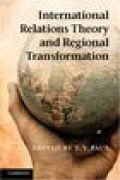
A comprehensive treatment of regional transformation, offering insights from different theoretical perspectives and generating a range of policy-relevantideas. How do different regions change into zones of conflict or cooperation?How and why do some regions remain in perpetual conflict? This book provides a comprehensive treatment of regional transformation, offering insights from arange of perspectives in order to generate theoretically innovative, testablepropositions and policy-relevant ideas. How do different regions change into zones of conflict or cooperation? How and why do some regions remain in perpetual conflict? This book provides a comprehensive treatment of regional transformation, offering insights from a range of perspectives in order to generate theoretically innovative, testable propositions and policy-relevant ideas. Regional transformation has emerged as a major topic of research during the past few decades, much of it seeking to understand how a region changes into a zone of conflict or cooperation and how and why some regions remain in perpetual conflict. Although the leading theoretical paradigms of international relations have something to say about regional order, a comprehensive treatment of this subject is missing from the literature. This book suggests that cross-paradigmatic engagement on regional orders can be valuable if it can generate theoretically innovative, testable propositions and policy-relevant ideas. The book brings together scholars from the dominant IR perspectives aiming to explain theregional order issue through multidimensional and multi-causal pathways and seeking meeting points between them. Using insights from IR theory, the contributors offer policy-relevant ideas which may benefit conflict-ridden regions ofthe world. Advance praise: 'Can regions transform themselves from zones of conflict to zones of cooperation and if so how? In addressing this core question, this volume skilfully bridges theoretical divides and offers strong comparative analysis on different trajectories of regional transformation, with some thought-provoking conclusions.' Louise Fawcett, St Catherine's College, University of Oxford 'This up-to-date and carefully crafted book delivers on its mainpromise. With an explicit focus on theories of international relations it inquires into the multidimensional and multi-causal pathways that create regionalorders. An outstanding group of specialists provide illuminating and cross-paradigmatic perspectives covering most of the world's main regions.' Peter J. Katzenstein, Walter S. Carpenter, Jr Professor of International Studies, Cornell University 'The great strength of this book is the range of scholarly perspectives represented. Realists, liberals, constructivists, and others offer competing logics and claims evaluated both quantitatively and qualitatively. No previous book has been anywhere near so comprehensive in its theoretical treatment of regional transformation. This book will be the definitive reference on regional transformation for some time to come.' Douglas Lemke, Pennsylvania State University 'A vigorous revitalization of theory and research at the regional level of analysis, comparing and blending the three dominant theoretical perspectives in international politics today. The contributors' surveys and assessments of the literature and major research findings, and their stimulating displays of research techniques, all in a clear and coherent fashion, offer an excellent resource for scholars and students.' Patrick M. Morgan, Tierney Chairin Global Peace and Conflict Studies, University of California, Irvine 'Much of the most interesting work on international integration is now concerned with regional networks of organizations and commerce. This book gives a great window on what's happening in scholarship and in the world.' Bruce Russett, Dean Acheson Research Professor of International Relations, Yale University INDICE: Part I. Introduction: 1. Regional transformation in international relations T. V. Paul; 2. How regions were made, and the legacies for world politics: an English school reconnaissance Barry Buzan; Part II. Realist Perspectives: 3. Realism and neorealism in the study of regional conflict Dale C. Copeland; 4. Neoclassical realism and the study of regional order Jeffrey W. Taliaferro; Part III. Liberal Perspectives: 5. Economic interdependence and regional peace John M. Owen, IV; 6. Regional organizations Ãá la carte: the effects of institutional elasticity Stephanie C. Hofmann and Frédéric Mérand; 7. Transforming regional security through liberal reforms John R. Oneal; Part IV. Constructivist Perspectives: 8. Ideas, norms, and regional orders Amitav Acharya; 9. Regional security practices and Russian–Atlantic relations Vincent Pouliot; Part V. Eclectic Perspectives: 10. The transformation of modern Europe: banalities of success John A. Hall; 11. Top-down peacemaking: why peace begins with states and not societies Norrin M. Ripsman; Part VI. Conclusions: 12. Strategies and mechanisms of regional change Stéfanie von Hlatky.
- ISBN: 978-1-107-60455-1
- Editorial: Cambridge University
- Encuadernacion: Rústica
- Páginas: 320
- Fecha Publicación: 23/02/2012
- Nº Volúmenes: 1
- Idioma: Inglés
